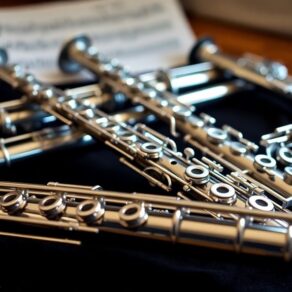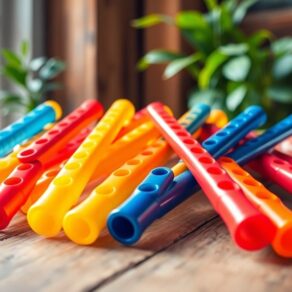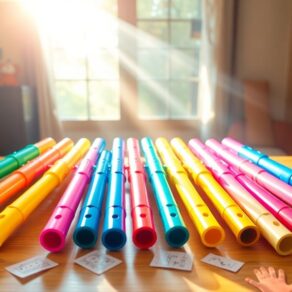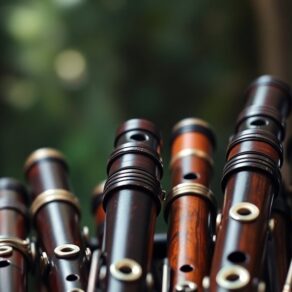If you're an aspiring musician searching for the best piccolo flutes, you've come to the right place. Start with models like the Glory Closed Hole C Flute and Paititi Professional Composite Wood Piccolo, known for their quality and playability. Look for features like closed-hole designs, durable materials, and included accessories, which enhance your experience. Pay attention to sound quality and comfort, as these factors greatly affect your performance. As you explore these options, you'll discover the perfect piccolo that suits your needs and musical aspirations. Stick around to uncover even more top recommendations and expert insights!
Key Takeaways
- Research top-rated piccolos, focusing on expert reviews to ensure quality and performance for aspiring musicians.
- Consider materials like cupronickel and composite woods for durability and sound quality, balancing budget and needs.
- Look for closed-hole designs and features like split E mechanisms to enhance playability and tone clarity.
- Check customer reviews for insights on sound quality, durability, and satisfaction, guiding your choice of brands.
- Ensure regular maintenance and care for optimal performance and longevity of the piccolo flute.
Glory Closed Hole C Flute with Case and Accessories
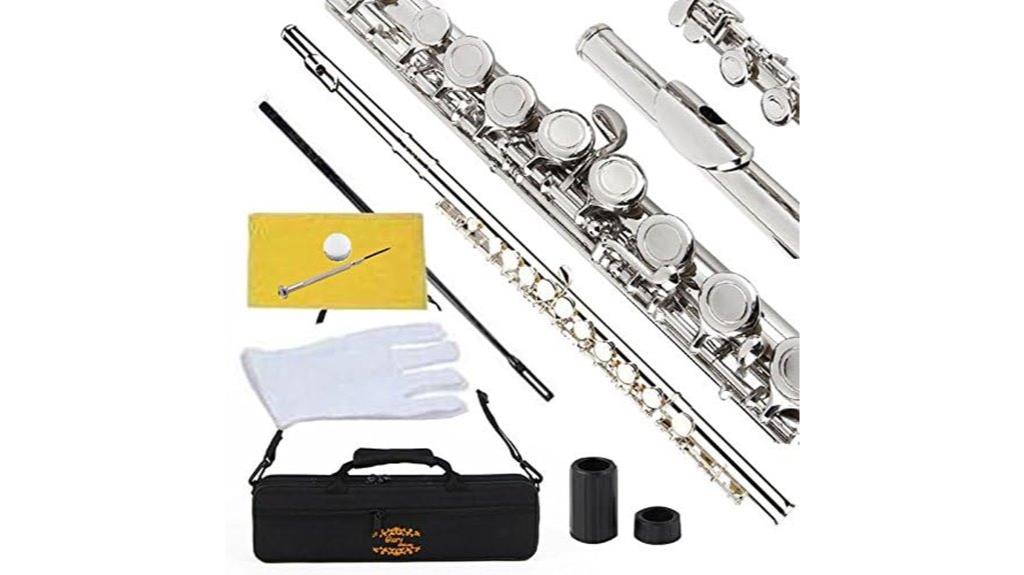
The Glory Closed Hole C Flute is an excellent choice for aspiring musicians, especially beginners looking to develop their skills. Made from real cupronickel, this flute offers high durability and exceptional tone quality. Its closed hole design features 16 keys, making it user-friendly for those just starting out. You'll appreciate the leather pads that provide water resistance and airtightness, ensuring a consistent sound. Weighing just 1.99 pounds, it's easy to handle, and the included case, tuning rod, cloth, and gloves make it a complete package. With a ranking of #1 in flutes, it's highly recommended by professionals and boasts positive customer reviews for sound quality and value. Investing in this flute sets you on a great path to musical success.
Best For: Beginners and children looking for a durable and high-quality flute to develop their musical skills.
Pros:
- Durable construction from real cupronickel ensures longevity and excellent tone quality.
- User-friendly closed hole design with 16 keys makes it ideal for new learners.
- Comes with essential accessories including a case, tuning rod, cloth, and gloves for added convenience.
Cons:
- Limited advanced features compared to higher-end models that experienced players might prefer.
- Weight may be a concern for very young children or those with smaller hands.
- Color options may not appeal to all users looking for a more traditional aesthetic.
Paititi Professional Composite Wood Piccolo Flute with Case
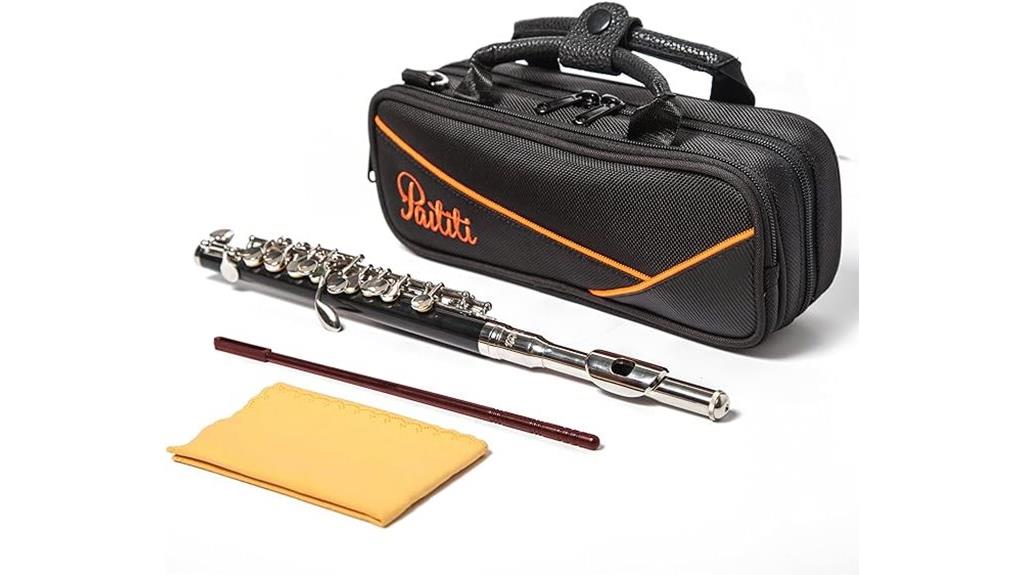
For aspiring musicians looking to step into the world of piccolo playing, the Paititi Professional Composite Wood Piccolo Flute with Case stands out as an excellent choice. This piccolo features a silver-plated head joint and an ebonite composite wood body, which mimics the acoustic properties of grenadilla wood. With a split E mechanism, it offers easier high E tuning, making it suitable for beginners and high school students, especially in marching bands. While it's compact and lightweight for outdoor performances, some users report quality inconsistencies, with issues like key functionality and pad sealing. Despite mixed reviews, many appreciate its sound quality when functioning well, making it a good value for beginner to intermediate players.
Best For: Aspiring musicians, particularly beginners and high school students, looking for a reliable and affordable piccolo for marching bands and casual performances.
Pros:
- Silver-plated head joint enhances playability and sound quality.
- Lightweight and compact design makes it ideal for outdoor performances.
- Good value for the price, suitable for beginner to intermediate players.
Cons:
- Quality inconsistencies can lead to issues with key functionality and pad sealing.
- Reports of loose screws and assembly quality problems over time.
- Difficulties with fast passages may arise due to key responsiveness issues.
Closed Hole C Flute Instrument with Cleaning Kit and Accessories
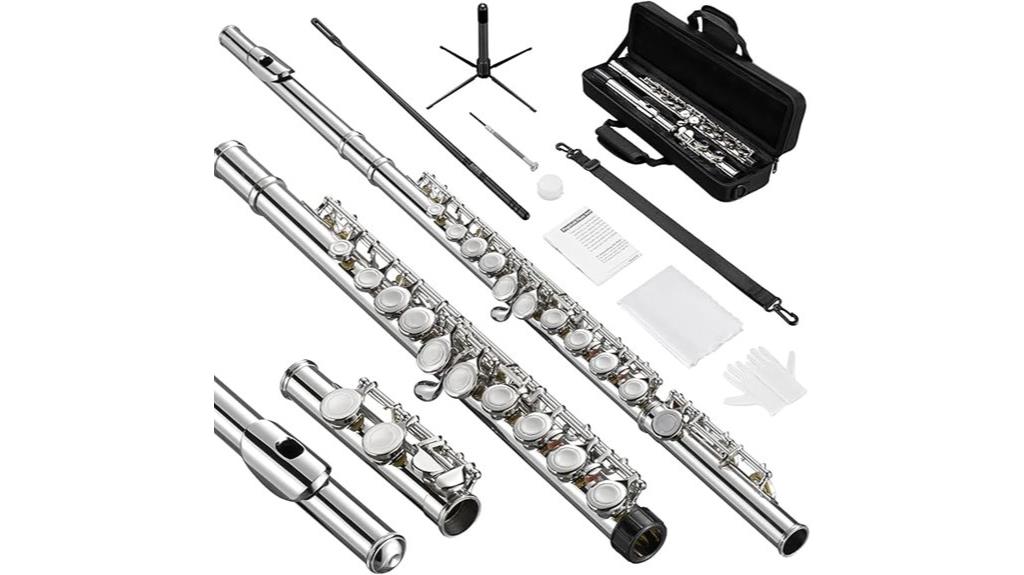
Looking for a flute that strikes the perfect balance between quality and affordability? The Closed Hole C Flute Instrument is your ideal choice. With exquisite workmanship and advanced technology, it offers an improved tone that beginners will appreciate. Its elegant nickel-plated design not only looks great but also features reliable materials like stainless steel springs and waterproof leather pads, ensuring durability. The undercut beveled embouchure hole design enhances sound quality, making it perfect for aspiring musicians. Weighing just 2.22 pounds and measuring 16.73 x 5.71 x 3.27 inches, it's also easy to handle. Customer reviews praise its performance and value, although some note minor sound quality issues. Overall, this flute is a fantastic option for students and beginners looking to learn.
Best For: This flute is best for beginners and students seeking a quality instrument at an affordable price.
Pros:
- Exquisite craftsmanship with advanced technology for enhanced tone quality.
- Durable materials such as stainless steel springs and waterproof leather pads ensure longevity.
- Elegant design with a shiny nickel-plated finish, making it visually appealing.
Cons:
- Some users report minor sound quality issues that may affect performance.
- A few reviews mention mechanical problems that could arise over time.
- While suitable for beginners, it may not meet the standards of more advanced players.
C Key Piccolo Closed Hole Flute with Case and Cleaning Kit
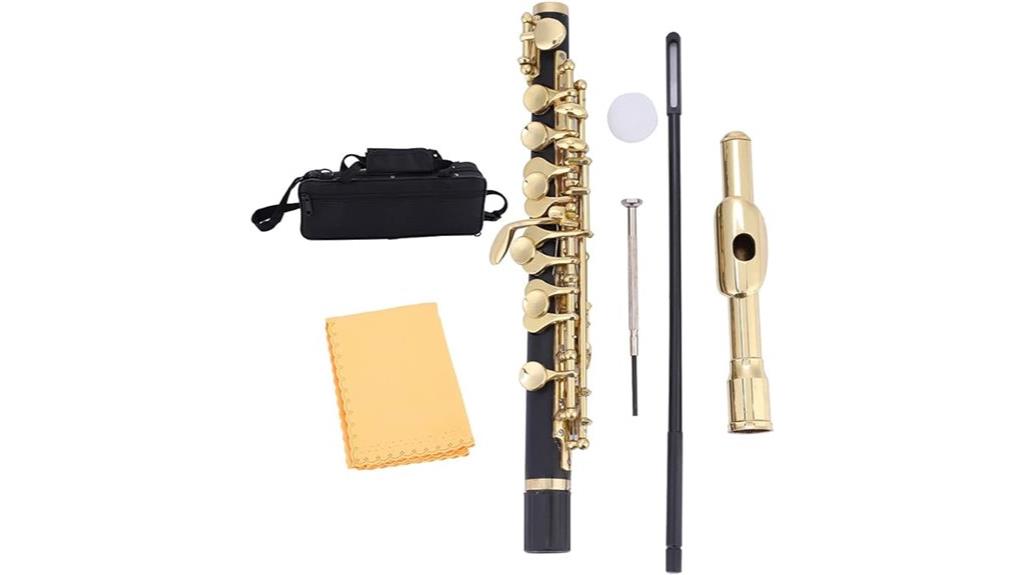
Aspiring musicians seeking a reliable and high-quality instrument will find the C Key Piccolo Closed Hole Flute with Case and Cleaning Kit an excellent choice. This half-size flute features an ABS body and a plated cupronickel head, providing durability and great sound. Its closed hole design is perfect for beginners and students, ensuring ease of play while producing amazing sound quality suitable for school bands and orchestras.
Included accessories like a plastic cleaning stick, cloth, and a screwdriver make maintenance simple. The padded box keeps your flute safe and secure. With an adjustable slide buckle strap, convenience is at your fingertips. Don't forget to use cork grease and clean your piccolo regularly to maintain its peak performance!
Best For: This C Key Piccolo Closed Hole Flute is best for aspiring musicians, students, and beginners looking for a reliable instrument to enhance their music education.
Pros:
- Durable construction with an ABS body and plated cupronickel head ensures longevity.
- Closed hole design provides ease of play, making it ideal for beginners.
- Includes maintenance accessories and a padded box for protection and convenience.
Cons:
- Limited advanced features may not satisfy more experienced players.
- Half size might not be comfortable for all adult musicians.
- Requires regular maintenance to ensure optimal performance.
Segolike Piccolo Flute Instruments Set
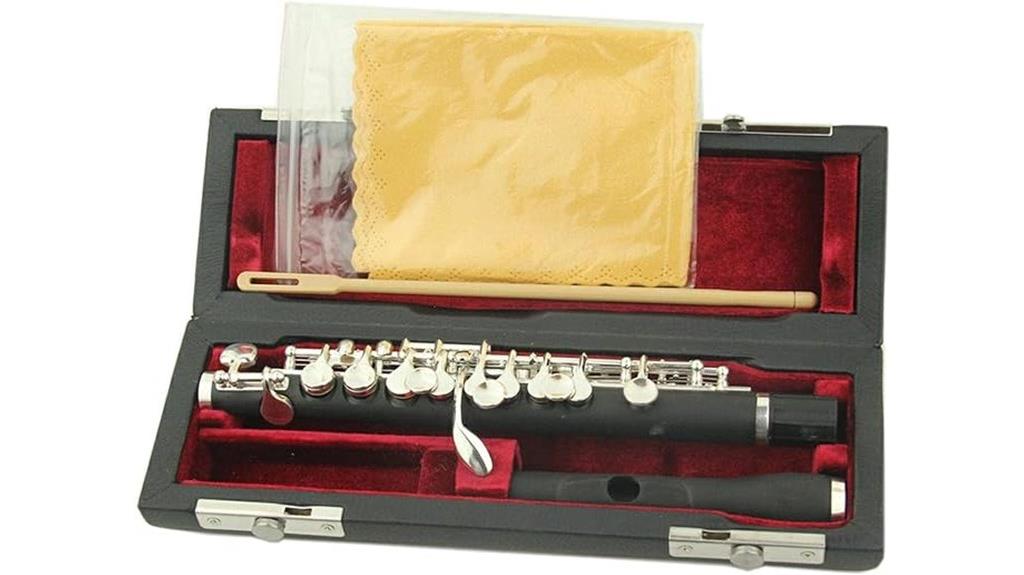
The Segolike Piccolo Flute Instruments Set stands out as an excellent choice for beginner musicians and students enthusiastic to join concert or marching bands. This set includes a silver, fashionable piccolo, a durable plush nylon-covered lightweight hard case, a cleaning cloth, and a screwdriver for maintenance. You'll appreciate the sweet sound it produces right out of the package, with no leaky keys or squeaky notes. While it requires slightly more air than traditional flutes, you'll find it manageable. This instrument is perfect for those looking to avoid high-end prices without sacrificing quality. Although some users note that it feels somewhat toy-like, many positive reviews highlight its value and sound quality, making it a solid option for aspiring musicians.
Best For: Beginner musicians and students looking for an affordable and quality piccolo for concert or marching bands.
Pros:
- High-quality sound with no leaky keys or squeaky notes.
- Comes with a durable hard case and maintenance tools for convenience.
- Great value for the price, making it suitable for budget-conscious buyers.
Cons:
- Some users find the feel and weight of the instrument somewhat toy-like.
- Quality may not match that of higher-end instruments, leading to mixed reviews.
- Lack of a handle on the case can be a drawback for portability.
Key of C Piccolo with PU Leather Box and Cleaning Cloth
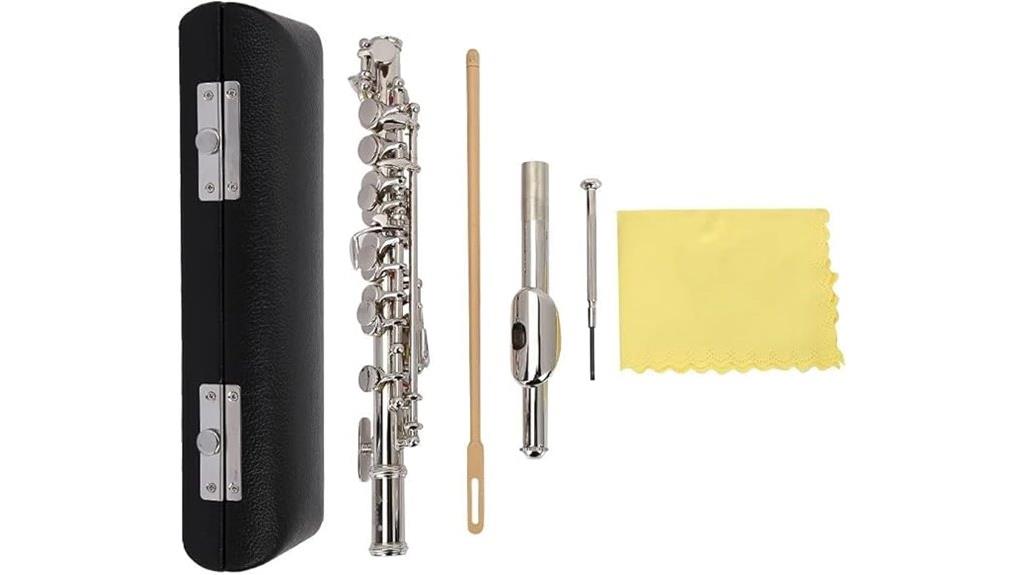
For young musicians enthusiastic to expand their skills, the Key of C Piccolo with PU leather box and cleaning cloth stands out as an exceptional choice. This open-hole, nickel-plated piccolo offers a smooth, mellow tone, making it perfect for beginners. With precision machining, it guarantees accurate sound and pitch, while excellent airtightness allows for easy button pushing, enhancing overall intonation. It's ideal for school ensembles, home practice, or music classes. While shifting from flute might pose a challenge, the familiar key layout aids in learning. This affordable option serves well until you're ready to upgrade to higher-end models. Plus, the included hard case and cleaning kit guarantee your instrument stays in top condition. Overall, it's a solid pick for aspiring musicians.
Best For: This piccolo is best for young musicians and beginners eager to learn and practice their skills in music.
Pros:
- Affordable option for beginners compared to higher-priced instruments.
- Produces smooth and mellow tones, enhancing the learning experience.
- Includes a hard case and cleaning kit to maintain the instrument's condition.
Cons:
- May be challenging for those new to wind instruments, especially transitioning from flute.
- Cheaper build quality compared to professional models, which may affect durability.
- Requires additional practice to master sharp and flat notes, as they differ from flute behavior.
C Key Piccolo Lightweight Woodwind Instrument for Beginners
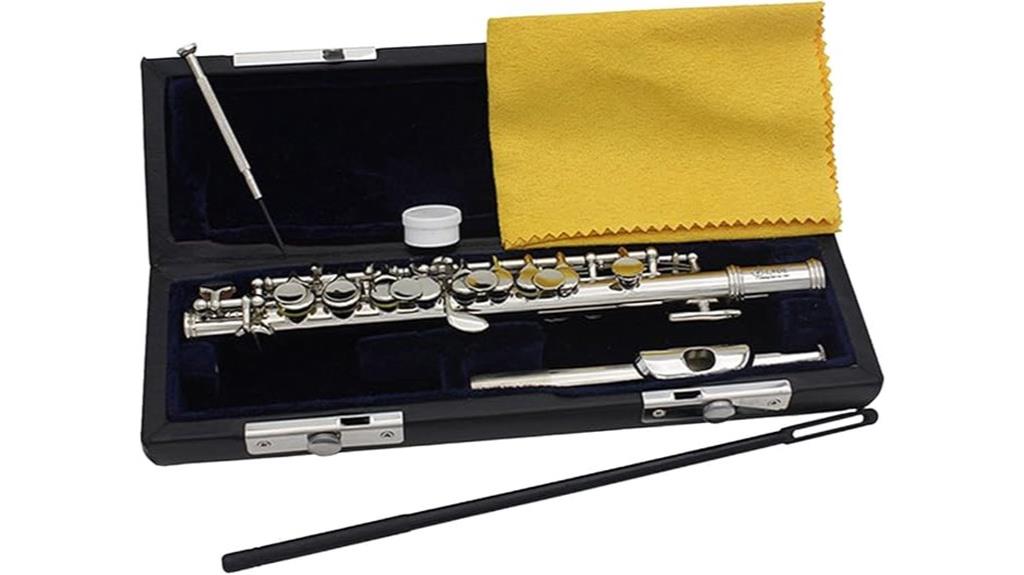
Looking to plunge into the world of music? The C Key Piccolo is a perfect choice for beginners like you. Its lightweight and compact design makes it easy to handle, while the 16 holes enhance your playability as you learn. Crafted from high-grade brass, this piccolo delivers a bright, powerful sound—ideal for both practice and performances.
You'll appreciate the included accessories, such as a PU leather hard case, cleaning rod, screwdriver, polish cloth, and cork, all designed to keep your instrument in top shape. With its fine craftsmanship and stylish plated finish, this piccolo not only sounds great but looks fantastic too. Whether for school bands or personal practice, this instrument is sure to inspire your musical journey.
Best For: Beginners looking to explore the world of music with a lightweight and easy-to-play woodwind instrument.
Pros:
- High-grade brass construction ensures excellent sound quality and durability.
- Lightweight and compact design makes it suitable for young players or those new to music.
- Comes with essential accessories for maintenance and protection, enhancing the overall value.
Cons:
- May require regular maintenance to keep the instrument in optimal condition.
- Limited advanced features compared to professional piccolos, which might not satisfy experienced players.
- Initial learning curve might be challenging for some beginners without prior musical experience.
Deloitte Piccolo C Key for Beginner Kids with Cleaning Kit and Carrying Case
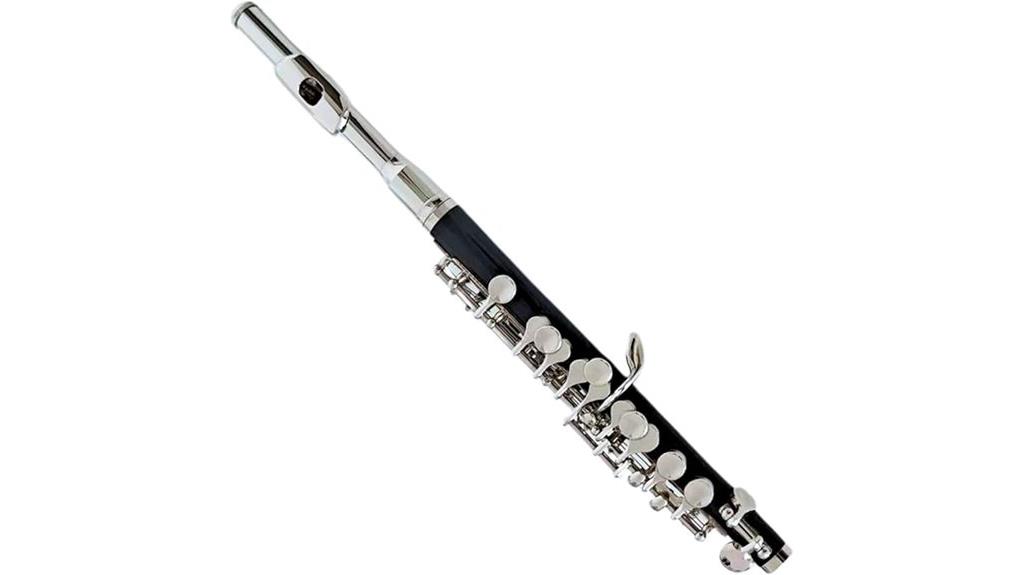
Deloitte's Piccolo C Key is an excellent choice for beginner kids enthusiastic to explore the world of music. Made from durable ABS material, this piccolo features nickel-plated keys that enhance durability and provide a sharp tone, one octave higher than a flute. Its closed-hole key design guarantees that young musicians can cover the notes accurately, while the double-layer leather pads resist deformation for longer-lasting playability. Included in the package is a cleaning kit and a carrying case, making it easy for you to maintain and transport the instrument. With its responsive round keys and a comfortable split E key design, your child will enjoy a positive playing experience. Overall, it's a fantastic value for aspiring musicians evolving from other woodwinds.
Best For: Beginner kids and students who are eager to learn and play the piccolo.
Pros:
- Durable construction with ABS material and nickel-plated keys for enhanced longevity.
- User-friendly design with closed-hole keys that aid beginners in accurate note coverage.
- Includes cleaning kit and carrying case for easy maintenance and transportation.
Cons:
- High-pitched sound may require ear protection for sensitive players.
- Limited advanced features may not satisfy more experienced musicians.
- Recommendations for professional guidance may be necessary for optimal learning.
Hall Crystal Flute 11204 – Inline Glass Piccolo in C – Green Ivy

The Hall Crystal Flute 11204 – Inline Glass Piccolo in C – Green Ivy is an exceptional choice for aspiring musicians who appreciate both beauty and functionality in their instruments. Handcrafted from borosilicate glass, this 6-hole flute features traditional fingering placement, making it ideal for Irish and traditional music. Its kiln-fired ivy decoration in green, brown, and black adds a stunning visual appeal. Users rave about the sweet, gentle tone and the instrument's versatility across various music styles. Many report a profound emotional connection when playing, with some noting it helped alleviate depression. Packaged in a stylish foam-lined dark-green box, it arrives quickly, ensuring your musical journey begins with quality craftsmanship and care.
Best For: Aspiring musicians seeking a beautiful, handcrafted instrument that excels in traditional and Irish music.
Pros:
- Exceptional sound quality with a sweet and gentle tone, suitable for various music styles.
- Stunning visual appeal with kiln-fired ivy decoration, enhancing its aesthetic value.
- Quick shipping and careful packaging ensure a satisfying purchase experience.
Cons:
- Some users may experience difficulty producing sound, indicating varying playability levels.
- Confusion may arise regarding the classification as a flute versus a piccolo, leading to differing expectations.
- Limited to a specific musical genre, which might not cater to all musical preferences.
Hall Crystal Flute 11002 – Inline Glass Piccolo in D – Carolina
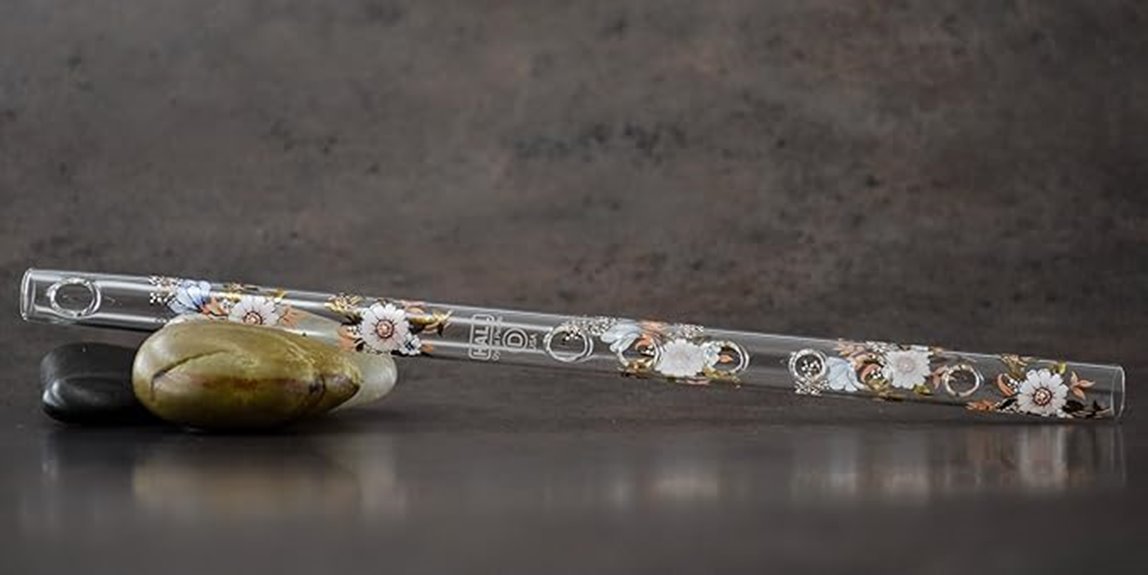
For musicians seeking a unique blend of beauty and sound quality, the Hall Crystal Flute 11002 is an excellent choice. This inline glass piccolo in D features traditional fingering placement and is perfect for Irish and traditional music. Handcrafted from high-quality borosilicate glass, its kiln-fired Carolina decoration in blue, pink, and 22K gold makes it visually stunning. While some users report initial challenges in producing sound, especially if adapting from other instruments, others find it easy to learn, particularly those familiar with the tin whistle. Its lightweight design enhances its appeal, and the foam-lined dark-green storage box adds convenience. Overall, the Hall Crystal Flute 11002 stands out for its unique sound quality and exquisite craftsmanship, making it a worthy investment.
Best For: Musicians looking for a visually stunning and unique instrument suitable for Irish and traditional music.
Pros:
- Beautiful kiln-fired decoration in blue, pink, and 22K gold enhances aesthetic appeal.
- Lightweight design makes it easy to handle and play for extended periods.
- Aligns with tin whistle fingerings, facilitating learning for those with prior experience.
Cons:
- Initial difficulty in producing sound may deter beginners transitioning from other instruments.
- Some experienced players find uneven hole sizes challenging to navigate.
- Occasional product issues, such as defects, can lead to additional costs for returns.
Factors to Consider When Choosing Piccolo Flutes
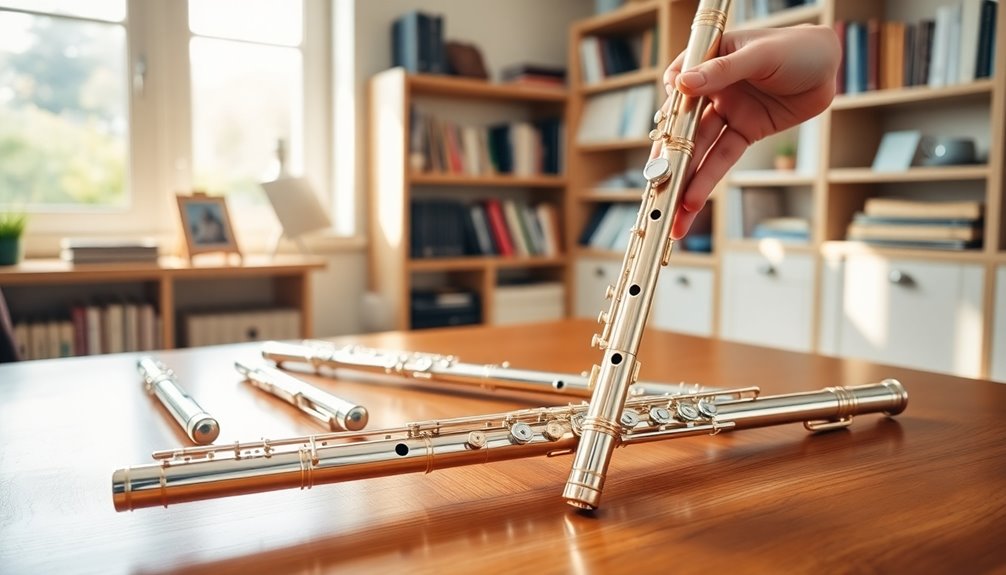
When you're choosing a piccolo flute, several key factors can impact your decision. You'll want to contemplate the material quality and durability, as well as the sound quality and tone that suits your playing style. Additionally, think about the design, size, weight, and key mechanism type to find the perfect fit for your needs.
Material Quality and Durability
Choosing the right piccolo flute hinges significantly on material quality and durability, which can profoundly influence both performance and longevity. The material you select can greatly affect your instrument's resilience to wear and tear. Options like ebonite, composite wood, and nickel-plated brass each provide different levels of durability and functionality.
For the best long-term performance, consider piccolos made from high-grade materials such as cupronickel or stainless steel. These materials resist corrosion and wear, ensuring your flute maintains consistent performance over time. If you're looking for a closed-hole design, choose one with leather pads that enhance air tightness and water resistance, which contributes to the overall durability of the mechanism.
Additionally, pay attention to the springs used in the key mechanism. High-grade needle springs are essential for maintaining responsiveness and long-term functionality. Composite materials are also a viable choice, as they can mimic the acoustic properties of traditional woods while offering improved durability, making them ideal for outdoor performances or student use. By prioritizing material quality, you'll invest in a piccolo that serves you well for years to come.
Sound Quality and Tone
Material quality plays an important role in determining the sound quality and tone of a piccolo flute. When you choose a piccolo, consider those made from composite woods, as they can mimic the acoustic properties of traditional woods, enhancing the instrument's overall tone. A well-designed embouchure hole and effective pad sealing are essential, too; they contribute greatly to producing clear and resonant sounds.
Additionally, if you're looking for better tuning for high E notes, seek out models with a split E mechanism. This feature can greatly improve your experience and sound quality.
Don't forget that the piccolo's compact size and lightweight nature make it an excellent choice for outdoor performances, like those in marching bands, without sacrificing sound quality.
Finally, think about key responsiveness and pad airtightness. These factors directly impact playability and the clarity of the tones you produce. By paying attention to these elements, you can choose a piccolo flute that meets your needs and helps you express your musicality with precision and beauty.
Design and Aesthetics
The design and aesthetics of a piccolo flute can considerably influence your playing experience and personal style. When choosing a piccolo, consider the materials used, such as ABS, ebonite composite wood, or nickel plating. Each material contributes not only to durability but also to the overall look of the instrument.
Aesthetically, piccolos often showcase unique decorative elements like kiln-fired colors or elegant finishes, making them visually appealing for both performers and collectors. The arrangement of tone holes, whether inline or offset, impacts playability and traditional finger placement, further influencing usability and aesthetic appeal.
Additionally, the craftsmanship of the piccolo can reflect its musical capabilities. Many piccolos are designed to produce a bright, penetrating sound, which can be visually represented through polished finishes and elegant designs. This combination of visual and auditory elements can enhance your confidence while performing.
Ultimately, choosing a piccolo that resonates with your personal aesthetic and meets your practical needs is essential. The right design can inspire creativity and elevate your overall musical journey. So, take your time to explore various options before making your decision!
Size and Weight Considerations
When it comes to selecting a piccolo flute, size and weight play essential roles in your overall playing experience. Piccolos are typically half the size of standard flutes, making them more compact and manageable, especially for younger players or those with smaller hands. Their lightweight design, usually weighing between 1.5 to 2.5 pounds, enhances portability and reduces fatigue during long playing sessions.
This half-size design makes piccolos ideal for marching bands and outdoor performances, where mobility is vital. A smaller instrument size can contribute to a sharper, brighter tone, which many players find appealing. However, you should be aware that it may demand more air support compared to larger flutes.
Weight and size considerations also affect playability; lighter piccolos are generally more responsive and easier to maneuver, particularly for rapid passages. This feature is especially beneficial for beginner players who are still developing their technique. By keeping these factors in mind, you can choose a piccolo flute that fits your needs, ensuring a more enjoyable and effective playing experience as you progress in your musical journey.
Key Mechanism Type
Choosing the right key mechanism for your piccolo flute can greatly impact your playing experience. You'll typically find two types: closed-hole and open-hole designs. For beginners, closed-hole piccolos are often the better choice. They feature round keys that offer easier finger coverage and a more secure seal, making them user-friendly and responsive.
On the other hand, open-hole mechanisms provide greater tonal flexibility and allow for advanced techniques, but they require precise finger placement and control. This level of complexity can be overwhelming for novices, potentially hindering your learning process.
Additionally, consider whether you want a split E mechanism, which aids in tuning high E notes. This feature can be particularly beneficial if you're aiming for precision in those higher registers.
Ultimately, your choice of key mechanism will considerably influence your playability and sound quality. If you're shifting from a flute, a closed-hole model is often recommended, as it eases the shift and enhances your overall learning experience. Take your time exploring these options to find the best fit for your musical journey.
Accessories and Maintenance
Selecting a piccolo flute goes beyond just the instrument itself; you'll want to contemplate the essential accessories and maintenance tools that come with it. A good piccolo should include a cleaning kit and a sturdy carrying case, both essential for keeping your flute in top shape. Regular maintenance is important, and using a piccolo-sized cleaning swab is necessary since standard cloths may not fit the instrument's delicate components.
Look for piccolos that come with joint grease, which guarantees smooth assembly and helps maintain key responsiveness and pad sealing over time. Pay attention to the quality of pads and corks; high-quality pads enhance airtightness and longevity, while proper cork lubrication makes assembly easier and improves playability.
Additionally, a cleaning rod often accompanies piccolos, allowing you to effectively clean and care for the instrument. This contributes greatly to your piccolo's overall sound quality and performance. By considering these accessories and maintenance needs, you'll guarantee that your piccolo remains in excellent condition as you develop your musical skills.
Price and Value Comparison
Understanding the price range of piccolo flutes is essential for aspiring musicians as it greatly influences your options. Typically, student-level instruments range from $50 to $300, while professional models can exceed $1,000. It's vital to balance your budget with your needs.
When comparing piccolos, look for customer reviews that highlight sound quality and durability. Performance can vary considerably based on materials and craftsmanship, so don't overlook this aspect. Additionally, assess included accessories, like cleaning kits and cases, as they can add value and enhance maintenance, especially for beginners.
Take note of the best sellers rank and user ratings; instruments with higher ratings (4 stars and above) often indicate better quality and satisfaction among buyers. This feedback can guide you in making an informed decision.
Finally, evaluate the materials used in construction. Piccolos made from composite wood can mimic the acoustic properties of more expensive woods while being more affordable. By considering these factors, you'll find a piccolo that not only fits your budget but also meets your musical aspirations.
Frequently Asked Questions
What Is the Difference Between a Closed Hole and Open Hole Piccolo?
Imagine standing at a musical crossroads, where closed hole piccolos offer ease and comfort, while open hole piccolos invite you to a world of nuance. The key difference lies in the design: closed hole piccolos have solid pads, making them more forgiving for beginners, while open hole piccolos feature holes that require precise finger placement, enhancing tone and control. Choose based on your comfort level and musical aspirations, and let your melodies soar!
How Do I Maintain and Clean My Piccolo Flute?
To maintain and clean your piccolo, start by swabbing out moisture with a soft cloth after each use. Avoid using excessive force on the pads and keys. For deeper cleaning, gently wipe the body with a damp cloth, ensuring no moisture gets into the tone holes. Regularly check for any signs of wear and tear. If you notice anything unusual, consider having a professional technician service it. Keeping it clean helps improve performance!
Can Beginners Learn on a Professional-Grade Piccolo?
Yes, you can learn on a professional-grade piccolo, but it's not always the best choice for beginners. These instruments often require advanced techniques and can be more challenging to handle. Starting on a student model might make it easier for you to develop your skills. Once you gain confidence and experience, you can shift to a professional-grade piccolo. Ultimately, it's about what helps you progress and enjoy playing the instrument.
What Is the Typical Price Range for a Good Beginner Piccolo?
If you think a decent beginner piccolo's gonna cost you the price of a small spaceship, think again! Typically, you'll find a good one ranging from $100 to $400. Sure, it's not pocket change, but it's way less than a trip to Mars! At this price, you can get a reliable instrument that won't make your neighbors cover their ears. So, go ahead and invest in your musical journey without breaking the bank!
Are There Specific Brands Known for Quality Piccolo Flutes?
When you're looking for quality piccolo flutes, a few brands stand out. You'll often find that Yamaha, Gemeinhardt, and Pearl produce reliable instruments known for their craftsmanship. Each brand offers models that suit various skill levels, so you can choose based on your playing style and budget. Don't forget to read reviews and try out different piccolos to see which one feels best in your hands. Happy playing!
Conclusion
Choosing the right piccolo flute can feel overwhelming, but remember, every great musician started somewhere. Don't let the fear of making a wrong choice hold you back! These top picks are designed to inspire and support your musical journey. Whether you're just starting or looking to upgrade, each flute offers unique features to enhance your skills. Embrace the joy of playing and let your passion shine through—your musical adventure awaits!


